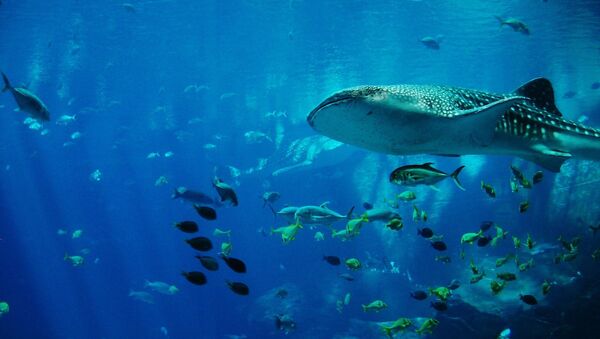In a world first, scientists have calculated the true age of whale sharks, using radiocarbon formed in the atmosphere during atomic bomb tests in the 1950s.
The findings, published in Frontiers in Marine Science, supports established theories these species have long life spans.
Bomb carbon reveals the age of whale sharks: https://t.co/9i714GsKpx pic.twitter.com/IP3Q2wbBrW
— Mark Meekan (@MarkMeekan) April 6, 2020
Dr Mark Meekan of the Australian Institute of Marine Science, who led an international team of researchers on the project, noted earlier modelling studies suggested the largest whale sharks may live as long as 100 years.
However, while scientific understanding of the movements, behaviour, connectivity and distribution of whale sharks has improved “dramatically” over the past decade, basic life history traits such as age, longevity and mortality remain “largely unknown”.
“Our study shows adult sharks can indeed attain great age and that long lifespans are probably a feature of the species. Now we have another piece of the jigsaw added,” Meekan concluded.
Orcas, flamingos, whale sharks, now sperm whales...all seen off Jamaica's coast in a matter of months. https://t.co/1qCavN5xPv
— Wayne Chen (@wcchen) April 5, 2020
The world’s largest fish have vertebrae featuring distinct ring-like bands, thought to increase in number with age, just as in tree trunks - although whether these rings formed annually, or every six months, has hitherto been unclear.
To resolve the issue, the researchers struck upon the novel idea of exploiting the radioactive legacy of the Cold War nuclear arms race. From 1955 - 1963, atomic bomb tests doubled the volume of isotope carbon-14 in the atmosphere. The isotope gradually moved through food webs into every living thing on the planet, producing an elevated carbon-14 label which endures to this day. This additional radioisotope also decays at a steady rate, meaning the amount contained in bone formed at one point in time will be slightly greater than that contained in otherwise identical bone formed more recently.
How old can a whale shark be? Radioactive pulse from bomb tests provides a new answer: very, very old https://t.co/HhluconxFr
— Dr Helen Scales (@helenscales) April 6, 2020
Carbon-14 has been subsequently used by archaeologists and historians to date ancient bones and artefacts. Researchers measured the carbon-14 levels in growth rings of two long-dead whale sharks - analysis showed one of the specimens to be 50 years old at the time of death.
"We found one growth ring was definitely deposited every year. This is very important, because if you over- or under-estimate growth rates you will inevitably end up with a management strategy that doesn't work, and you'll see the population crash,” Dr Meekan concluded.

